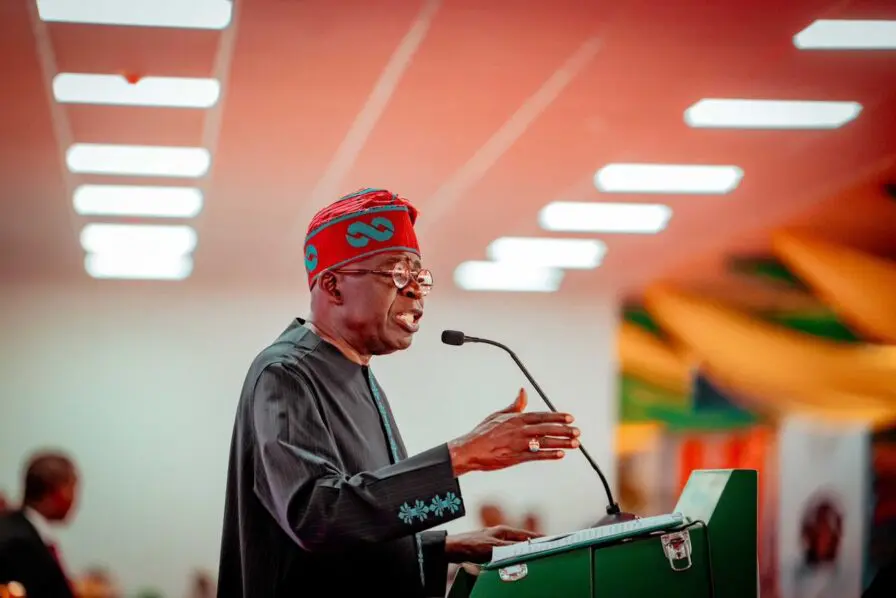The Federal Government has unveiled a six-point plan, complete with timelines, to implement the “Nigeria First” policy aimed at strengthening local industries and driving sustainable economic growth.
According to the government, the initiative will focus on promoting domestic production, improving competitiveness, and creating an enabling environment for manufacturers to thrive.
Highlights of the six-point plan include:
- Prioritising local production in all federal government procurement processes.
- Establishing a quarterly compliance dashboard beginning in the first quarter of 2026 to monitor progress and accountability.
- Enhancing product quality and consumer trust at the point of sale to boost confidence in locally made goods.
- Providing long-term financing options for manufacturers to encourage expansion and innovation.
- Improving energy and logistics infrastructure, including dedicated power supply for industrial clusters.
- Developing people, skills, and safety standards through the Industrial Training Fund’s Production Grid Skills 2026 initiative, focusing on manufacturing job vacancies and safer commerce supply chains.
President Bola Tinubu made this known on Thursday during the 5th Adeola Odutola Lecture and the 53rd Annual General Meeting (AGM) of the Manufacturers Association of Nigeria (MAN), themed ‘Nigeria First: Prioritising Patronage of Made-in-Nigeria’, held in Lagos.
Represented by John Enoh, Minister of State, Federal Ministry of Industry, Trade and Investment, the President described the Nigeria First policy as a deliberate strategy to utilise public funding, procurement, and partnerships to stimulate demand for locally produced goods that meet international standards. He said the policy also seeks to reduce structural production costs to enable Nigerian manufacturers to compete globally.
According to Tinubu, the Nigeria First initiative aligns with the newly validated Nigerian Industrial Policy, which was developed with broad contributions from various sectors, including mining.
He stated that the country will now transition from the validation stage to the sequenced implementation of the Nigeria First policy, guided by transparent milestones.
Citing data from the National Bureau of Statistics (NBS), the President noted that “the industrial sector grew 7.45 percent and manufacturing grew 1.6 percent, contributing 7.81 percent to GDP,” describing this as “progress but not yet a mission accomplished.”
“These are tangible foundations on which Nigeria First must now scale, through demand that is predictable, standards that are trusted, finance that is patient, energy that is reliable, and trade rules that reward value addition at home,” he said.
“I will now set out six practical commitments with clear owners and timelines on what Nigeria First means,” the President noted.
Tinubu urged manufacturers to maintain uncompromised quality standards, prioritise research and development, and adhere to strict process discipline, noting that “e-MANCAP is an asset and not a hurdle.”
He further encouraged manufacturers to “source locally where competitive and to collaborate on phased localization where not feasible yet.”
“MAN will be expected to share accurate capacity and price data with the Federal Ministry of Industry and Investment and review for public procurements to aid procurement planning.”
“MAN will also be expected to partner with FIRO and SMEDAN to mentor MSME suppliers,” he added.
Tinubu assured citizens that they should “expect greater visibility of Made in Nigeria products in public procurement and key sectors, better value and safety through standards enforcement and product untilisation.”
“More local jobs as firms expand lines, localise inputs and group distribution networks,” he said.
In his welcome address, MAN President Francis Meshioye expressed optimism about the policy’s potential, saying manufacturers were eager to see the “Nigeria First” policy fully legislated and implemented.
“We strongly believe this policy holds the potential to significantly boost the fortune of the manufacturing sector and improve the well-being of the Nigerian citizenry,” he said.

